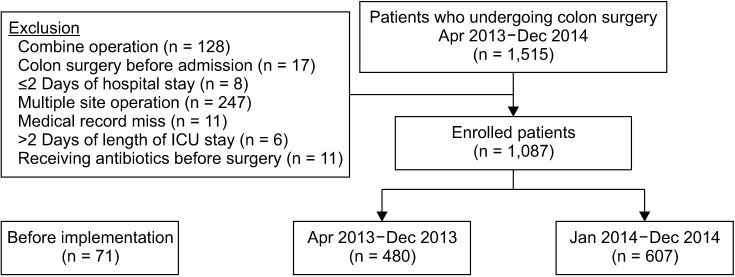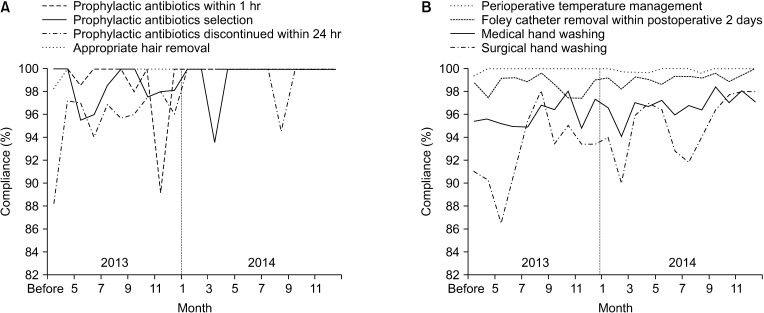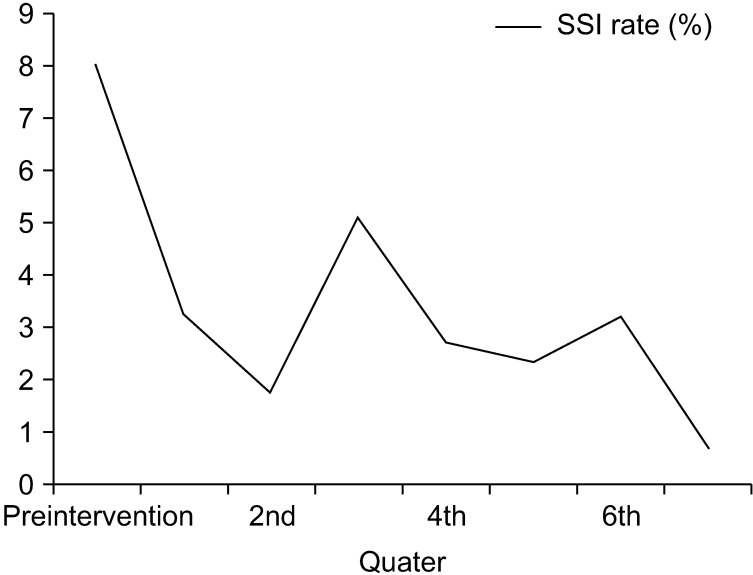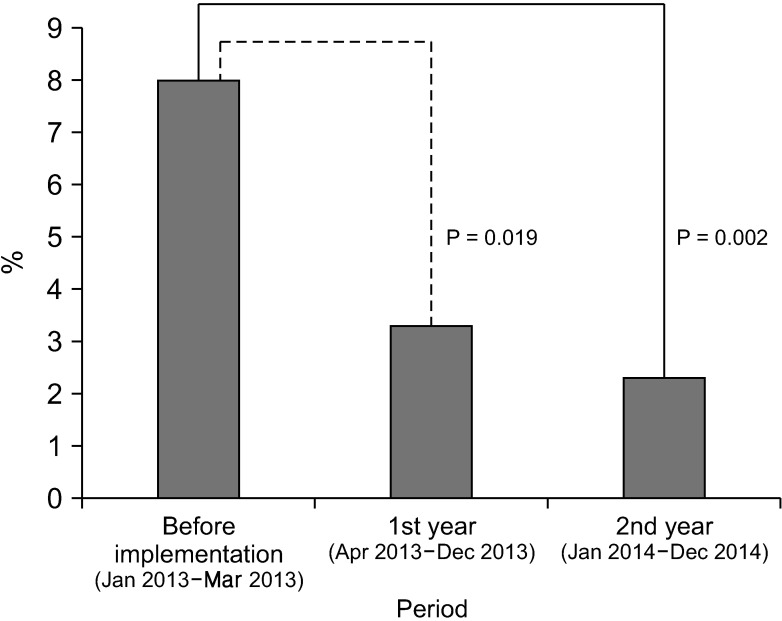Ann Surg Treat Res.
2020 Nov;99(5):285-293. 10.4174/astr.2020.99.5.285.
Implementing a multidisciplinary care bundle to reduce colon surgical site infections
- Affiliations
-
- 1Department of Critical Care Medicine, Samsung Medical Center, Sungkyunkwan University School of Medicine, Seoul, Korea
- 2Department of Surgery, Samsung Medical Center, Sungkyunkwan University School of Medicine, Seoul, Korea
- 3Department of Surgery, Soonchunhyang University Bucheon Hospital, Bucheon, Korea
- 4Department of Infectious Diseases, Samsung Medical Center, Sungkyunkwan University School of Medicine, Seoul, Korea
- 5Infection Control Office, Samsung Medical Center, Seoul, Korea
- KMID: 2508325
- DOI: http://doi.org/10.4174/astr.2020.99.5.285
Abstract
- Purpose
The aim of this study was to investigate how rates of surgical site infections (SSI) were changed over 2 years after applying colon SSI bundle in patients who underwent colon surgery.
Methods
The multidisciplinary working group developed a care bundle consisting of 8 components, including several recommendations of Surgical Care Improvement Project and monitoring of medical/surgical hand washing. We implemented the care bundle for each patient who underwent colon surgery from April 2013 to December 2014.
Results
Overall bundle compliance was 87.9% before implementation, 88.2% in 2013, and 90.5% in 2014. In particular, compliance of the following 3 components was substantial improved during the project period; discontinuation of prophylactic antimicrobial agent within 24 hours of surgery (from 88.3% to 100%), surgical hand washing (from 50.0% to 78.9%), and medical hand washing (from 74.7% to 82.8%). The rate of SSI was 8.0% (12/150) during 3 months before implementation, 3.3% (16/480) from April to December in 2013, and 2.3% (14/607) in 2014.
Conclusion
After implementation of multidisciplinary care bundle, the compliance of each component was increased and rates of SSIs were significantly decreased compared to those before the quality improvement project.
Figure
Reference
-
1. Tanner J, Padley W, Assadian O, Leaper D, Kiernan M, Edmiston C. Do surgical care bundles reduce the risk of surgical site infections in patients undergoing colorectal surgery? A systematic review and cohort meta-analysis of 8,515 patients. Surgery. 2015; 158:66–77. PMID: 25920911.2. Waits SA, Fritze D, Banerjee M, Zhang W, Kubus J, Englesbe MJ, et al. Developing an argument for bundled interventions to reduce surgical site infection in colorectal surgery. Surgery. 2014; 155:602–606. PMID: 24468041.3. Arriaga AF, Lancaster RT, Berry WR, Regenbogen SE, Lipsitz SR, Kaafarani HM, et al. The better colectomy project: association of evidence-based best-practice adherence rates to outcomes in colorectal surgery. Ann Surg. 2009; 250:507–513. PMID: 19734778.4. Lutfiyya W, Parsons D, Breen J. A colorectal “care bundle” to reduce surgical site infections in colorectal surgeries: a single-center experience. Perm J. 2012; 16:10–16.5. Pronovost P, Needham D, Berenholtz S, Sinopoli D, Chu H, Cosgrove S, et al. An intervention to decrease catheter-related bloodstream infections in the ICU. N Engl J Med. 2006; 355:2725–2732. PMID: 17192537.6. Tanner J, Kiernan M, Hilliam R, Davey S, Collins E, Wood T, et al. Effectiveness of a care bundle to reduce surgical site infections in patients having open colorectal surgery. Ann R Coll Surg Engl. 2016; 98:270–274. PMID: 26924481.7. Lee KY, Coleman K, Paech D, Norris S, Tan JT. The epidemiology and cost of surgical site infections in Korea: a systematic review. J Korean Surg Soc. 2011; 81:295–307. PMID: 22148121.8. Lee JH, Han HS, Min SK, Lee HK, Lee JH, Kim YW, et al. Surveillance of surgical wound infections among patients from the department of surgery: prospective trial. Ann Surg Treat Res. 2004; 66:133–137.9. Cima R, Dankbar E, Lovely J, Pendlimari R, Aronhalt K, Nehring S, et al. Colorectal surgery surgical site infection reduction program: a national surgical quality improvement program. Driven multidisciplinary single-institution experience. J Am Coll Surg. 2013; 216:23–33. PMID: 23127793.10. Wick EC, Hobson DB, Bennett JL, Demski R, Maragakis L, Gearhart SL, et al. Implementation of a surgical comprehensive unit-based safety program to reduce surgical site infections. J Am Coll Surg. 2012; 215:193–200. PMID: 22632912.11. Selby LV, Sjoberg DD, Cassella D, Sovel M, Weiser MR, Sepkowitz K, et al. Comparing surgical infections in National Surgical Quality Improvement Project and an Institutional Database. J Surg Res. 2015; 196:416–420. PMID: 25840487.12. Gastmeier P, Geffers C, Brandt C, Zuschneid I, Sohr D, Schwab F, et al. Effectiveness of a nationwide nosocomial infection surveillance system for reducing nosocomial infections. J Hosp Infect. 2006; 64:16–22. PMID: 16820247.13. Culver DH, Horan TC, Gaynes RP, Martone WJ, Jarvis WR, Emori TG, et al. Surgical wound infection rates by wound class, operative procedure, and patient risk index. National Nosocomial Infections Surveillance System. Am J Med. 1991; 91:152S–157S. PMID: 1656747.14. Keenan JE, Speicher PJ, Thacker JK, Walter M, Kuchibhatla M, Mantyh CR. The preventive surgical site infection bundle in colorectal surgery: an effective approach to surgical site infection reduction and health care cost savings. JAMA Surg. 2014; 149:1045–1052. PMID: 25163027.15. Hawn MT, Vick CC, Richman J, Holman W, Deierhoi RJ, Graham LA, et al. Surgical site infection prevention: time to move beyond the surgical care improvement program. Ann Surg. 2011; 254:494–499. PMID: 21817889.16. Berenguer CM, Ochsner MG Jr, Lord SA, Senkowski CK. Improving surgical site infections: using National Surgical Quality Improvement Program data to institute Surgical Care Improvement Project protocols in improving surgical outcomes. J Am Coll Surg. 2011; 210:737–741. 741–743.17. Garcia N, Fogel S, Baker C, Remine S, Jones J. Should compliance with the Surgical Care Improvement Project (SCIP) process measures determine Medicare and Medicaid reimbursement rates? Am Surg. 2012; 78:653–656. PMID: 22643259.18. Crolla RM, van der Laan L, Veen EJ, Hendriks Y, van Schendel C, Kluytmans J. Reduction of surgical site infections after implementation of a bundle of care. PLoS One. 2012; 7:e44599. PMID: 22962619.19. Rasouli MR, Jaberi MM, Hozack WJ, Parvizi J, Rothman RH. Surgical care improvement project (SCIP): has its mission succeeded? J Arthroplasty. 2013; 28:1072–1075. PMID: 23602416.20. Hechenbleikner EM, Hobson DB, Bennett JL, Wick EC. Implementation of surgical quality improvement: auditing tool for surgical site infection prevention practices. Dis Colon Rectum. 2015; 58:83–90. PMID: 25489698.21. Bull A, Wilson J, Worth LJ, Stuart RL, Gillespie E, Waxman B, et al. A bundle of care to reduce colorectal surgical infections: an Australian experience. J Hosp Infect. 2011; 78:297–301. PMID: 21664720.22. Pastor C, Artinyan A, Varma MG, Kim E, Gibbs L, Garcia-Aguilar J. An increase in compliance with the Surgical Care Improvement Project measures does not prevent surgical site infection in colorectal surgery. Dis Colon Rectum. 2010; 53:24–30. PMID: 20010346.23. Allegranzi B, Pittet D. Role of hand hygiene in healthcare-associated infection prevention. J Hosp Infect. 2009; 73:305–315. PMID: 19720430.24. Pittet D, Hugonnet S, Harbarth S, Mourouga P, Sauvan V, Touveneau S, et al. Effectiveness of a hospital-wide programme to improve compliance with hand hygiene. Infection Control Programme. Lancet. 2000; 356:1307–1312. PMID: 11073019.25. Garus-Pakowska A, Sobala W, Szatko F. Observance of hand washing procedures performed by the medical personnel before patient contact. Part I. Int J Occup Med Environ Health. 2013; 26:113–121. PMID: 23532824.26. Tvedt C, Bukholm G. Alcohol-based hand disinfection: a more robust hand-hygiene method in an intensive care unit. J Hosp Infect. 2005; 59:229–234. PMID: 15694980.27. Khan A, Nausheen S. Compliance of surgical hand washing before surgery: role of remote video surveillance. J Pak Med Assoc. 2017; 67:92–96. PMID: 28065962.
- Full Text Links
- Actions
-
Cited
- CITED
-
- Close
- Share
- Similar articles
-
- Implementing a Sepsis Resuscitation Bundle Improved Clinical Outcome: A Before-and-After Study
- Central line-associated bloodstream infections in the intensive care unit: importance of the care bundle
- High Compliance With Surgical Site Infection (SSI) Prevention Bundle Reduces Incisional SSI After Colorectal Surgery
- Risk Factors for Surgical Site Infections According to Electronic Medical Records Data
- Current Status of Healthcare-associated Infections in Korea





